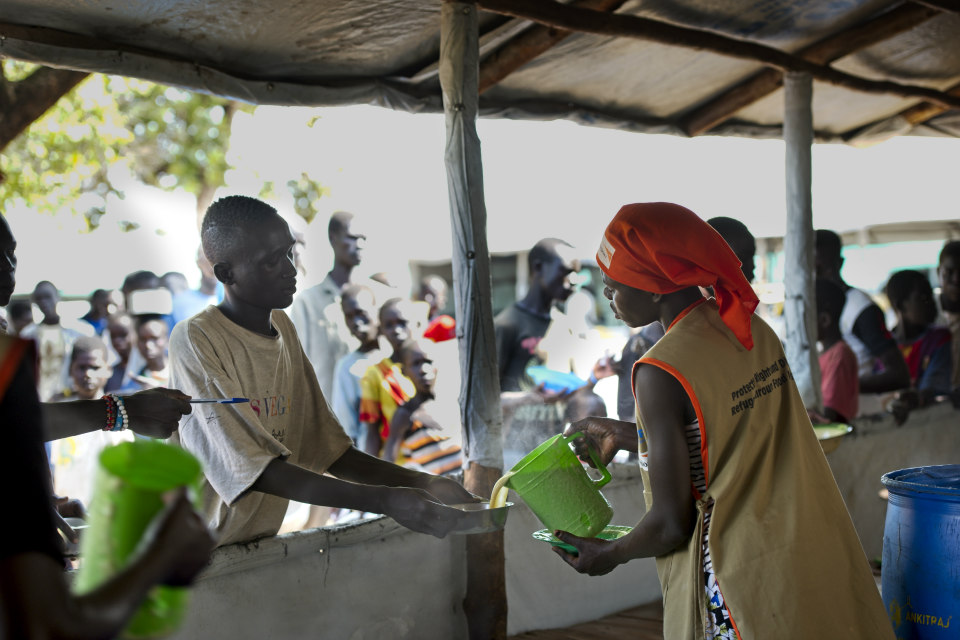Preventing hunger as a Weapon of War
Statement by Ambassador Jonathan Allen, Chargé d’Affaires, at the Security Council Briefing on Conflict and Hunger.

Thank you Madam President.
Our briefers today have sounded the alarm and warned us of the surging levels of acute hunger, which are largely attributable to conflict. But this is not for the first time.
Over a year ago, the Secretary General drew this Council’s attention to the change in the long-term trend in global hunger: it was now rising for the first time in a decade. The situation was critical, he said; the UN predicted four simultaneous famines, threatening the lives of 20 million people.
Through the generosity of donors and the actions of humanitarian and development organisations, international financial institutions and regional governments, famine itself was prevented, or at least contained.
But let’s be clear. Over the past year, suffering and hunger has increased. In the world today, one out of every nine people is undernourished. That is 815 million people, an increase of 38 million in the last year.
Conflict is the main reason for this increase in hunger. 60 percent of hungry and malnourished people live in countries affected by conflict.
Almost 75% of the world’s 155 million stunted children under the age of five live in countries affected by conflict. It is the most vulnerable – particularly women and children – who are most affected by hunger. These figures indicate that the actions we have taken in the past year to reduce hunger have not been enough. As so clearly put by our briefers, we must examine and address the root causes of this severe hunger crisis if we hope to put an end to it.
Madam President,
Last August, this Council adopted a Presidential Statement that, for the first time, acknowledged that hunger and conflict are linked. That was a step forward, but it only gives us half the picture. In the statement, the Security Council emphasized with deep concern (and I quote), “that ongoing conflicts and violence have devastating humanitarian consequences and hinder an effective humanitarian response ….and are therefore a major cause of famine.”
This reads as if hunger is just an inevitable consequence of war, or a by-product of the changing nature of conflict. That is clearly not the case. Hunger does not need to be a product of war, and I hope we can make that clear in future Council products.
We must understand and acknowledge the true nature of the problem to take the necessary collective actions to break the deadly links between conflict and hunger. In this regard, we see three key areas of responsibility for this Council:
First, to redouble efforts to prevent and resolve conflicts, and build and sustain peace.
Second, we must uphold international humanitarian and human rights law. We are fast approaching a new normal where warring parties think it is acceptable to destroy crops, interrupt markets, and attack water points, hospitals, and schools. Too often there is a lack of accountability for the state actors and other parties to conflict who are responsible for increasing hunger.
Third, we must actively safeguard humanitarian access. In almost all of the crises before this Council, people are denied or unable to access essential aid, often with the most vulnerable people being the worst affected. The Security Council can and must play a key role to enable the safe, unhindered and rapid access of populations to humanitarian assistance. We must engage with national and regional authorities to apply diplomatic pressure and insist on the removal of access constraints, and we should pursue accountability for any violations.
Madam President,
We must think creatively when responding to this crisis. For example, to identify the most serious cases of obstructed access objectively, we could use a model that articulates access in terms of needs met by the delivery of health care, protection, and education, rather than simply by numbers of aid convoys. We could also factor in denial of access to the design of sanctions mandated by this Council more routinely.
Madam President,
We are extremely grateful to you and to the Kingdom of the Netherlands for calling this meeting because it is a subject about which the UK deeply cares and is deeply engaged as the third largest humanitarian donor.
The scale of the challenge we are facing is clear. The threat of famine remains. In a world of abundance, 815 million people are still hungry. Their hunger is used as a weapon of war. We must act and use the tools at our disposal to show the world that this is not acceptable and that we do not accept it. We must seek accountability and we must make the consequences of these appalling actions clear.
Thank you.
Updates to this page
-
World location not added.
-
First published.